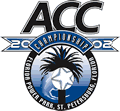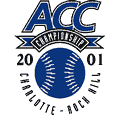
A bracket or tournament bracket is a tree diagram that represents the series of games played during a knockout tournament. Different knockout tournament formats have different brackets; the simplest and most common is that of the single-elimination tournament. The name "bracket" is American English, derived from the resemblance of the links in the tree diagram to the bracket punctuation symbol ] or [. The closest British term is draw, although this implies an element of chance, whereas some brackets are determined entirely by seeding.
There are a number of formats used in various levels of competition in sports and games to determine an overall champion. Some of the most common are the single elimination, the best-of- series, the total points series more commonly known as on aggregate, and the round-robin tournament.

The Southeastern Conference Baseball Tournament is the conference tournament in baseball for the Southeastern Conference (SEC). It is a partially double-elimination tournament and seeding is based on regular season conference records. The winner receives the conference's automatic bid to the NCAA Division I Baseball Tournament. The SEC Tournament champion is separate from the conference champion. The conference championship is determined solely by regular season record.

The 2002 Atlantic Coast Conference Baseball Tournament was held at the Florida Power Park in St. Petersburg, FL from May 21st through May 26th. Florida State won the tournament and earned the Atlantic Coast Conference's automatic bid to the 2002 NCAA Division I Baseball Tournament.

The 2001 Atlantic Coast Conference Baseball Tournament was held at the Knights Stadium in Fort Mill, SC from May 15th through May 20th. Wake Forest won the tournament and earned the Atlantic Coast Conference's automatic bid to the 2001 NCAA Division I Baseball Tournament.
The 2000 Atlantic Coast Conference Baseball Tournament was held at the Knights Stadium in Fort Mill, SC from May 16th through May 21st. Georgia Tech won the tournament and earned the Atlantic Coast Conference's automatic bid to the 2000 NCAA Division I Baseball Tournament.
The Conference USA Baseball Tournament is the conference championship tournament in baseball for Conference USA (C-USA). The winner of the tournament receives an automatic bid to the NCAA Division I Baseball Tournament. The tournament format, which has changed several times, currently consists of an eight-team double-elimination tournament format, in which the winners of two four-team brackets play in a single-game final. Rice, which has won the tournament seven times, is the most successful team in the tournament's history.
The Sun Belt Conference Baseball Tournament is the conference championship tournament in baseball for the Sun Belt Conference. The winner of the tournament receives the conference's automatic bid to the NCAA Division I Baseball Tournament. After Coastal Carolina University hosts the competition in Conway, South Carolina in 2019, the tournament will move to a neutral site, Riverwalk Stadium in Montgomery, AL, from 2020 to 2024.
The 1993 Atlantic Coast Conference Baseball Tournament was held in Greenville, SC from May 15 through May 20. Clemson won the tournament and earned the Atlantic Coast Conference's automatic bid to the 1993 NCAA Division I Baseball Tournament.
The 1992 Atlantic Coast Conference Baseball Tournament was the 1992 postseason baseball championship of the NCAA Division I Atlantic Coast Conference, held at Greenville Municipal Stadium in Greenville, South Carolina from May 9-13. NC State defeated Clemson in the championship game, earning the conference's automatic bid to the 1992 NCAA Division I Baseball Tournament.
The 2013 Atlantic Coast Conference Baseball Tournament was held from May 22 through May 26 at Durham Bulls Athletic Park in Durham, North Carolina. The annual tournament determines the conference champion of the Division I Atlantic Coast Conference for college baseball. Top seeded North Carolina won the tournament and received the league's automatic bid to the 2013 NCAA Division I Baseball Tournament. It was North Carolina's sixth ACC Tournament win. This was the last of 19 athletic championship events held by the conference in the 2012–13 academic year. This was the sixth time the ACC hosted its baseball championship in Durham.

The 2014 Atlantic Coast Conference Baseball Tournament was held from May 20 through May 25 at NewBridge Bank Park in Greensboro, North Carolina. The annual tournament determines the conference champion of the Division I Atlantic Coast Conference for college baseball. Georgia Tech won their ninth tournament championship to earn the league's automatic bid to the 2014 NCAA Division I Baseball Tournament. This is the last of 19 athletic championship events held by the conference in the 2013–14 academic year. With the victory, Georgia Tech tied Clemson for the most tournament championships.
The 2015 Atlantic Coast Conference Baseball Tournament was held from May 19 through May 24 at Durham Bulls Athletic Park in Durham, North Carolina. The annual tournament determines the conference champion of the Division I Atlantic Coast Conference for college baseball. Florida State won their sixth tournament championship and received the league's automatic bid to the 2015 NCAA Division I Baseball Tournament. This was the last of 19 athletic championship events held by the conference in the 2014–15 academic year.

The 2016 NCAA Division I Baseball Tournament began on Friday, June 3, 2016, as part of the 2016 NCAA Division I baseball season. The 64-team, double-elimination tournament concluded with the 2016 College World Series (CWS) in Omaha, Nebraska, starting on June 18, 2016, and ending on June 30, 2016. The 64 participating NCAA Division I college baseball teams were selected out of 298 eligible teams. Thirty-one teams were awarded an automatic bid, as champions of their conferences; the remaining 33 teams were selected at-large by the NCAA Division I Baseball Committee.

The 2016 Atlantic Coast Conference Baseball Tournament was held from May 24 through May 29 at Durham Bulls Athletic Park in Durham, North Carolina. The annual tournament determined the conference champion of the Division I Atlantic Coast Conference for college baseball. The tournament champion will receive the league's automatic bid to the 2016 NCAA Division I Baseball Tournament. This is the last of 19 athletic championship events held by the conference in the 2015–16 academic year.
The 2017 Atlantic Coast Conference Baseball Tournament was held from May 23 through May 28 at Louisville Slugger Field in Louisville, Kentucky. The annual tournament determines the conference champion of the Division I Atlantic Coast Conference for college baseball. The tournament champion receives the league's automatic bid to the 2017 NCAA Division I Baseball Tournament. This was the last of 19 athletic championship events held by the conference in the 2016–17 academic year.
The 2018 Atlantic Coast Conference Baseball Tournament was held from May 22 through May 27 at Durham Bulls Athletic Park in Durham, North Carolina. The annual tournament determines the conference champion of the Division I Atlantic Coast Conference for college baseball. The tournament champion receives the league's automatic bid to the 2018 NCAA Division I Baseball Tournament. This was the last of 19 athletic championship events held by the conference in the 2017–18 academic year.
The 2019 Atlantic Coast Conference Baseball Tournament was held from May 21 through May 26 at Durham Bulls Athletic Park in Durham, North Carolina. The annual tournament determined the conference champion of the Division I Atlantic Coast Conference for college baseball. The tournament champion, North Carolina, received the league's automatic bid to the 2019 NCAA Division I Baseball Tournament. This was the last of 19 athletic championship events held by the conference in the 2018–19 academic year.
The 2021 Atlantic Coast Conference Baseball Tournament was held from May 25 through May 30 at Truist Field in Charlotte, North Carolina. The annual tournament determined the conference champion of the Division I Atlantic Coast Conference for college baseball. Duke will receive the league's automatic bid to the 2021 NCAA Division I Baseball Tournament after defeating NC State in the Championship game.
The 2022 Atlantic Coast Conference Baseball Tournament will be held from May 24 through May 29 at Truist Field in Charlotte, North Carolina. The annual tournament will determine the conference champion of the Division I Atlantic Coast Conference for college baseball. The tournament champion, will receive the league's automatic bid to the 2022 NCAA Division I Baseball Tournament.







